What’s so special about cosplay is that you decide who you want to be. For one day, you can take on the role of a superhero, a warrior or a pop star. In the blink of an eye, you get to change your hair color, your gender, your age – but what about the color of your skin?
Yeah, why not?
If you’re white and you don’t see this as a problem, you’ve probably never uploaded a photo of yourself in cosplay, skin tanned or darkened with make-up, and shared it on an international platform. If you did, chances are you received comments calling you out for “blackfacing” or “racefacing”.
European cosplayers are often baffled, and even feel insulted, when confronted with the idea that their cosplay is – or could be perceived as – racist. And what do people do when they are accused of racism – especially in this loaded cultural climate? Instead of listening and finding the courage to apologize, they often retreat into their bubble. Or worse: they lash out with full force, deaf to serious arguments and advice. That’s when things turn vile and nasty – for themselves, for the cosplay community, and for any person of color (PoC) who happens to witness the shitstorm.
As a cosplayer and a writer with a PhD in Fan Studies, it sickens me to see my community so broken, so angry and insecure, so wrapped up in social media wars that only result in more insecurity and less understanding.
Two years ago, I tried to bridge the gap and educate German cosplayers with an article in Cohaku magazine that explains the significance of blackface, and the impact that – even unintended – racist acts can have on people of color. (Here’s a link to the German print issue.) A lot of the racism in German society is under the surface, and we don’t have an outspoken black community or a space for PoC to really express themselves in fandom. That is why I felt the need to speak up, but I couldn’t do it alone.
Thank you to the cosplayers who agreed to be interviewed by me, and who gave me permission to use their stories again or update them for this English adaptation!
So, what is “blackface”, anyway? Why is it a problem in the cosplay community, and what can you – European cosplayers in particular – do to make it better?
Why do we even talk about it in Europe?
Historically, “blackface” was practiced by white actors and involved putting on dark (often pitch-black) make-up to mimic people of African heritage. These theatre acts were especially popular in North America in late 1800’s minstrel shows, which were a mixture of crude humour and variety show. No actual African-Americans were featured in these shows. While racism and social inequality between ethnic groups are still a feature of American culture today, the practice of blackface is now taboo.
What many people don’t realize is that similar theatre traditions existed in European countries, and to this date you can still see white actors with darkened skin being cast in Black roles. But there’s little public debate about this topic, and we don’t even have a word for blackface in German.
Most European countries have their own history of colonialism in Africa that they’re slowly coming to terms with. Over a hundred years ago, the German Empire exiled, starved and slaughtered tens of thousands of Herero and Nama people in what is today Namibia. In 2015, the German parliament acknowledged this as an ethnic cleansing. (The Wikipedia article has sources in English and German if you’d like to learn more.)
I’d say we’re finally catching on, but it took us a while to get there and we still have lots of work to do on our own doorstep. No need to point the finger at America when it comes to dealing with racist heritage.
What does that have to do with cosplay?
When you follow online debates about the latest blackface controversy, commenters are right to point out that cosplayers don’t have the same intent as historic minstrel actors. They don’t want to ridicule anyone with their costume. The reason I wear this is because I want to honor the character and do them justice!
And unlike the contemporary theatre version of blackface, or whites being cast as black characters, black cosplayers are not automatically excluded because you “take away” their character. The more people cosplay as the same character, the better actually! Every cool cosplay means a win for the fandom it’s from.
So, what’s the big deal?
When you ask PoC in your community what they think about someone changing their skin tone for cosplay, you may not get a straight answer. In fact, when I first interviewed Cissy Cosplay from France and Myriam McFly from Luxembourg for my Cohaku piece in 2017, they said that they did not mind people using whatever make-up they wanted, as long as it didn’t look like you just smeared dirt in your face. And that’s understandable: when you belong to a minority group and this practice is so normalized by white mainstream culture, why would you go around telling people that you don’t approve?
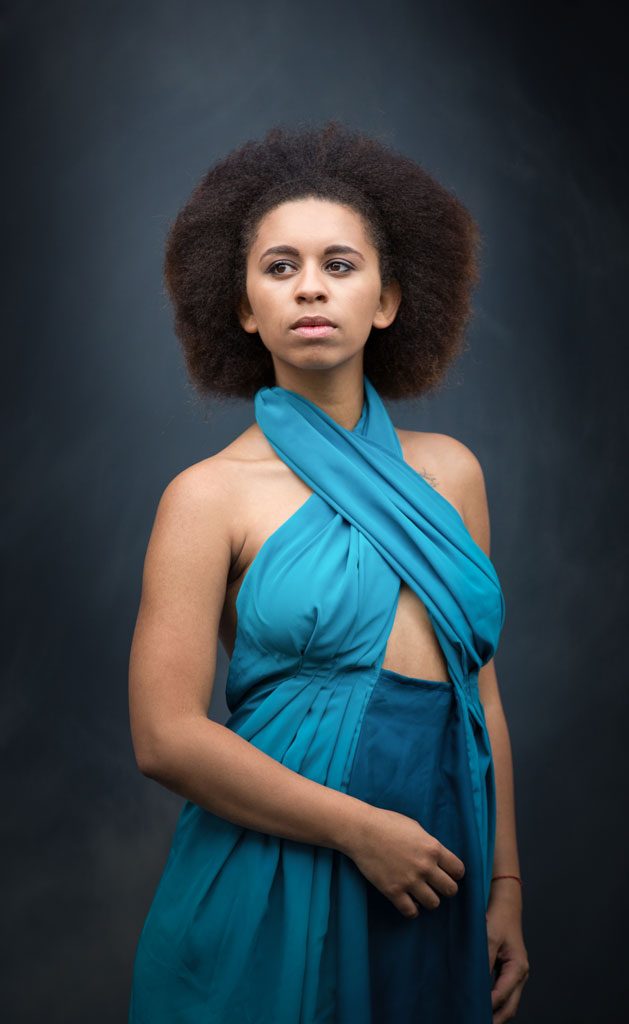
Here’s what Cissy says today:
“I actually always feel offended, but I just pretend it doesn’t affect me. I don’t want my skin tone to be an issue so I act like it’s not. But it is. Because it’s how the society is and thinking that we do not care about skin tone in the cosplay community is naive. I get why people don’t see this as an offense because you need to live it to understand.”
Cissy
So just because you have a non-white friend who doesn’t find your cosplay offensive, that doesn’t make it a-OK. Everyone’s experience of racism will be different depending on where and how they grew up, and what they go through in their daily life and in the fan community. But as a PoC living in a predominantly white society, or a society that favors light skin, they have experienced racism in their daily life, and they do pay attention to behavior that shows them that they don’t belong.
It’s a question of how much more offense they can take, not whether they feel offended at all.

When white people use make-up, a mask, or a suit to change their color of skin, they always call upon the historical baggage of blackface – whether they want to or not. For PoC, it triggers very real memories. Like German-American artist and cosplayer Cana told me:
“It feels like they don’t show respect. Like they’re making fun of my skin tone. It reminds me of my childhood: in elementary school, we would stage a Christmas pageant every year. When I refused to play Balthasar [the dark-skinned member of the Three Wise Men] they’d pick one of the white kids and smear pitch-black paint in their face. The only thing that seemed to matter about Balthasar was his dark skin.”
Cana
To this date, children in Germany and neighboring countries go around representing the Three Wise Men, one of them adorned with black or brown face paint. (Just look at this German Wikipedia article about star singers.)
And literally every place in the world has their own tradition or media spectacle revolving around painting one’s skin dark to mimic a stereotypical character. (This Washington Post article gives some examples and talks about local efforts to change or defend this practice.)
In the debate about blackface in cosplay, a popular counter-argument is that we don’t do it to make fun of people, so it’s somehow different from real-life blackface.
“Of course cosplayers don’t do it with racist intent, which is what the term blackface originally stands for. But the fact remains that my skin tone is not a costume. And people just have to respect that.”
Myriam McFly
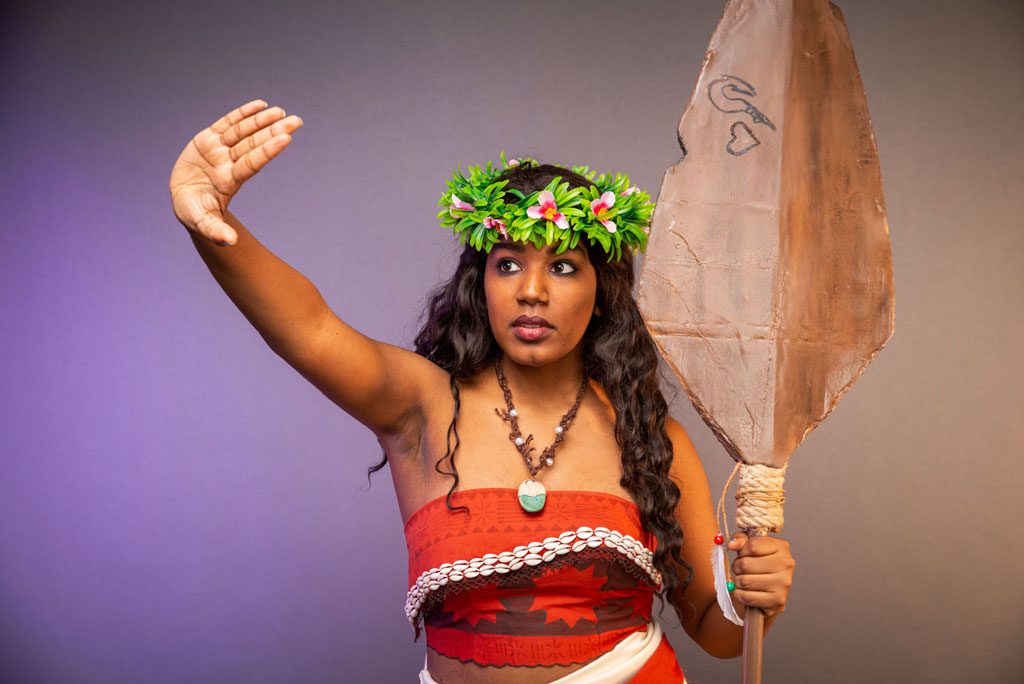
Learning empathy
I’m a white European cosplayer, so pale that I’m almost translucent. Can I even begin to understand what it feels like to be a person of color, go to a convention to have fun, and be confronted with someone using my skin tone and my heritage as a part of their costume?
My friend Calssara (German, and pale as myself) has an inspirational story she likes to share. Back in 2011, her first journey to a convention abroad brought her to Mexico. When she and her friend arrived at the con, “we were greeted by a group of Mexican cosplayers wearing authentic Nazi uniforms. They had learned that two German guests would be there, and they thought we’d appreciate the gesture!”
What these poor souls didn’t realize is that not only are Nazi uniforms and symbols actually banned in Germany today, older Germans who lived through World War II generally don’t share such a favorable view of the good old times. Calssara’s grandmother had shared with her true stories about the war and the Third Reich, “so when these uniforms came walking around the corner – I knew it’s just costumes, they’re not going to hurt me, but all of a sudden I felt this fear rise inside me, and a very bad, creepy feeling.”
Today, Calssara compares these emotions to what PoC con attendees must feel when they run into a white cosplayer in dark face paint. Which is why she stopped tanning herself with paint for Nidalee (League of Legends) and even sold the costume.
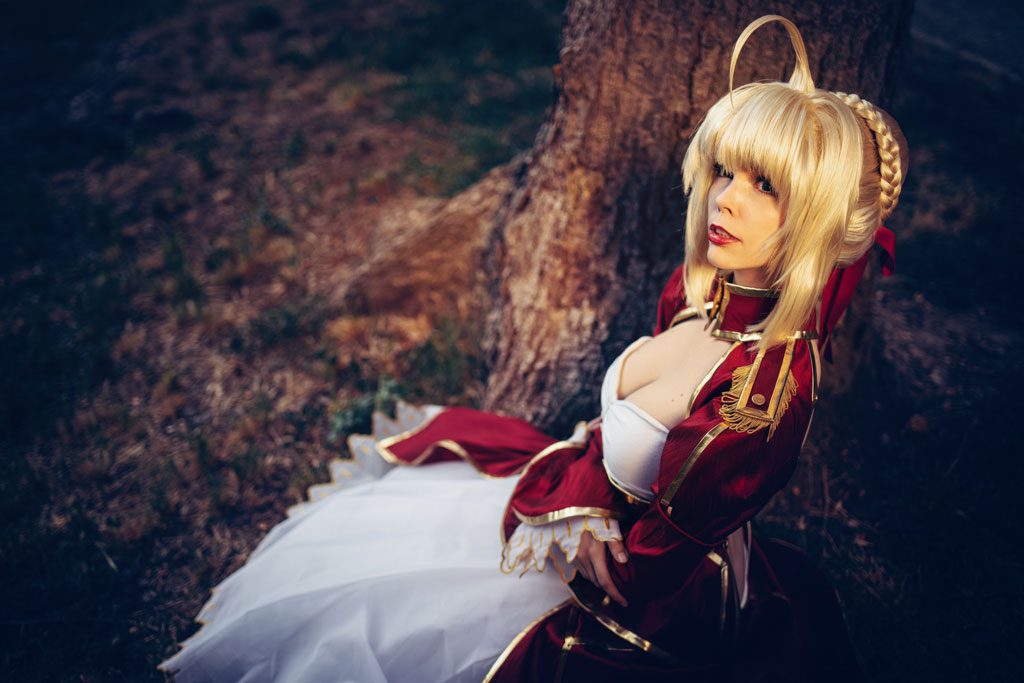
Cosplay is not a representation of everyday life, and yet it can trigger very real emotions. That’s why we consider maybe not wearing a gory horror costume to a family-friendly con, or roleplaying violent scenes in public. We know our act could be hurtful. It might scare other attendees and remind them of horrible experiences they’ve had. Ask yourself: Do I really have to do this, and is it worth it to insult my fellow fans?
And when you do it for of an international contest or on a big online platform, the question only becomes more relevant because your performance will be amplified, and it will make an impact on the public perception of our hobby.
To be honest, there aren’t many white European cosplayers who are vocal about racism and blackface in cosplay, but their numbers are growing. Calssara educated herself through her personal network, which includes cosplayers from all over the world, and watching YouTube videos by black vloggers like Kat Blaque. “This woke me up to the fact that for these people, it really is a problem. It’s also not something that’s completely removed from my own life.”
Here’s a link to just one of Kat’s videos that I like: she explains what “white privilege” is and why, as a white person, you profit from structural advantages even if you’re not rich and powerful.
White Normality, Black Invisibility
In the European cosplay community, it’s easy to forget that there’s an ethnically and racially diverse world outside of fandom. It’s almost the same on the internet, as Cissy has observed: “Google ‘Halibel cosplay’ or ‘Nidalee cosplay’ and you’ll see: only. White. People. Or mostly white people on the first pages. But the characters are tanned / black, aren’t they?”
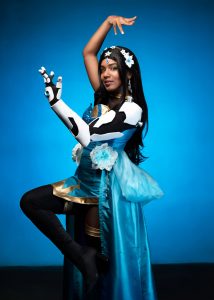
When Myriam started cosplaying in 2006, she started out playing non-black characters that are everywhere in anime. It took her 5 years to find out that she could cosplay as a darker-skinned character (Hannah from Black Butler 2) and that she enjoyed it much more! Being able to portray someone with a similar skin tone and getting the recognition she deserved felt so good for a change.
I often hear white cosplayers complain that they can’t cosplay their favorite character anymore without being accused of either blackfacing or “whitewashing”. First of all, think about it the other way round: how many white or pale characters do you see on screen who already look like you, and how must this make non-white fans feel?
“Take a minute to think about all these PoC cosplayers who would love to embody a white character but will never be as perfect as you.”
Cissy
Secondly, whitewashing is a problem in the cultural industry, but it isn’t really a thing in the cosplay world. It’s a complaint that’s directed at producers, not fans, who take a non-white character or story and transplant them into an all-white scenario for mass appeal at the box office. Understandably, PoC are excited when they do see a character who looks like them. And yes, there are some people who would prefer to see these characters cosplayed by black or brown cosplayers for a change. However, it is rare that white cosplayers get blamed for wanting to portray these characters, too. The majority of cosplayers, including PoC, will support you in this endeavor, as long as you make it clear that you respect their boundaries.
“When a white person wants to cosplay a black character and decides to darken their skin, it takes away the only privilege a PoC cosplayer could have.”
Cissy
In a nutshell: cosplay whomever you want. Just be respectful and don’t paint your skin.
Accuracy
As a cosplayer, I admit that accuracy and attention to detail have always been important to me. Maybe because I used to do historic reenactment, more likely because it’s just my nature. So when I started cosplaying over a decade ago, changing the color of my skin to look more like my character seemed like a viable option. At the time, no one in my cosplay community seemed to be bothered by that and I never received any comments calling me out for it or making me aware of the racist implications.
Although I’m pretty sure that my head already knew that this couldn’t be right (I must’ve read an article or two on postcolonialism as a cultural studies major…), my heart burned for Fran from Final Fantasy XII and I went all out for my cosplay – tan suit, body paint and all. We were a whole group of Viera (a race of feral, dark-skinned bunny girls… the perfect fetish!) and people loved it. We had the time of our lives.
For better or worse, we don’t live in an offline world anymore. Everything you post to social media will eventually escape your bubble and find its way to people who don’t know you like your friends do. If PoC cosplayers saw our Viera costumes today, they’d see our painted faces and they’d realize that they don’t belong. And that is a message I never want to send again.
An excuse I admit I’ve told myself in the past is that people paint themselves green or blue all the time, and no one feels offended by that. So what difference does it make if I choose brown paint instead? Well, unlike black or brown people, neither aliens nor night elves are a group that we have to get along with in real life. Changing your skin tone to a real-world human skin tone isn’t just offensive because it triggers so many real-life memories of racism:
“It’s offensive because you decide that accuracy is more important than people.”
Cissy
“Sadly, some people have skewed priorities and I find that very sad. They’d rather pay respect to a fictional character than to a real human being.”
Myriam McFly
As PoC artist Cana has observed, blackface cosplay reveals a more general problem with the community’s values. “When cosplayers paint their skin lighter or darker because they think they couldn’t otherwise portray this character – what kind of image are we putting in their head? Where do we draw the line?” For Cana, this thinking implies an unhealthy and negative body image. It’s like saying that you can only cosplay a character who is the same weight, age and gender as you.
“Cosplay isn’t about being perfect copies of fictional characters! It’s about enjoying yourself and treating each other with respect.”
Cana

When you love a character, find a way to portray them that’s respectful, both to other people and to yourself. Don’t beat yourself up about having to have a screen-accurate body.
“When I see a character I really want to cosplay, I ask myself: would I look just as good in this costume without painting myself? Or are there any other cool characters whom I could cosplay instead? As a white person, you have so many options.”
Calssara
Do you find it exhausting to always think about your skin tone and whether your character portrayal will be acceptable? Welcome to the reality of a PoC cosplayer! If you think about it a lot in your character choices, you’ve made the first step towards empathy, and finding a solution for yourself.
Backlash
It pains me to see the supporters of blackface offenders fly the “Cosplay Is for Everyone” flag. They take a positive slogan and turn it into something narrow and exclusive, because what they mean is that they should be allowed to express themselves artistically at all costs. You say my costume hurts your feelings? Well that’s your problem then, not mine! – This is exactly the kind of mindset that ensures that minorities don’t feel welcome.
By not listening to what others have to say, and not giving them a space where they feel safe to speak their mind without being judged and ridiculed, we only perpetuate the existing cosplay culture. This culture is very biased towards white people who believe that racism is a mere fantasy, and that people who point out the opposite are kill-joys who want to ruin their hobby for them.
And I understand where that comes from. It sucks to be called out publicly on the internet, or to see your friend getting dragged into a flame war. For my Cohaku piece, I talked to cosplayers who had been accused of black- or brownface, and it wasn’t pretty. Korean-German cosplayer downpourin did a cos test for Thai athlete Phichit (Yuri on Ice) using tan make-up. She didn’t think much of it at the time, but the photo triggered a heated debate in her Instagram comments. This didn’t help to change her mind about the topic, but made her wary.
For many European cosplayers, it’s the reactions that irk them more than the act itself. Benbenben, who grew up in a mixed-race family and considers himself color-blind, is appalled by the “hatred that some cosplayers receive online because they have overstepped an imaginary boundary in other people’s heads” even though they truly believed they were “just having fun and expressing themselves artistically”.
I love these people, and I try very hard to respect their opinion as long as they don’t fight back with hatred. I know that’s easy to say for me as a painfully pale European, not as easy for someone whose skin is being used as a cosplay accessory, and whose very real boundaries are being crossed every day. But we have to try, or people will never learn.
A way forward
There is no perfect way laid out before us. Let’s start by listening to each other more, and inviting people in who don’t look, feel, or think like us. Cosplay is about expressing yourself, yes, but it’s so much more fun and challenging if you learn new things along the way. Educate yourself, break the mold, and expand your own network beyond your local community or social media bubble. Follow five new PoC cosplayers today. Be ready to have your mind changed.
As a community, we could be so much better and more powerful if we realized that cosplay is not equal for everyone at the moment, and that it takes hard work from all of us to change that.
It’s up to the majority of cosplayers to be more inclusive, to stop a practice when minorities tell them it’s hurtful, and invite others in who may question their privilege. At the same time, it’s also hard work for PoC cosplayers. Of course they’re angry and frustrated. And of course they’re tired of explaining Racism 101 over and over again to people who have never experienced it. It takes time to change minds, and oh so many words. But I believe that it’s all worth it.
Because this thing called cosplay – it’s what I love, it’s what I breathe, it’s what keeps me going even when I fail. It has allowed me to meet or e-meet people from all over the world, and I want it to bring us together, not separate us.
Are you a cosplayer looking for resources and ways to cope with the COVID-19 pandemic? Check out my new blog post!
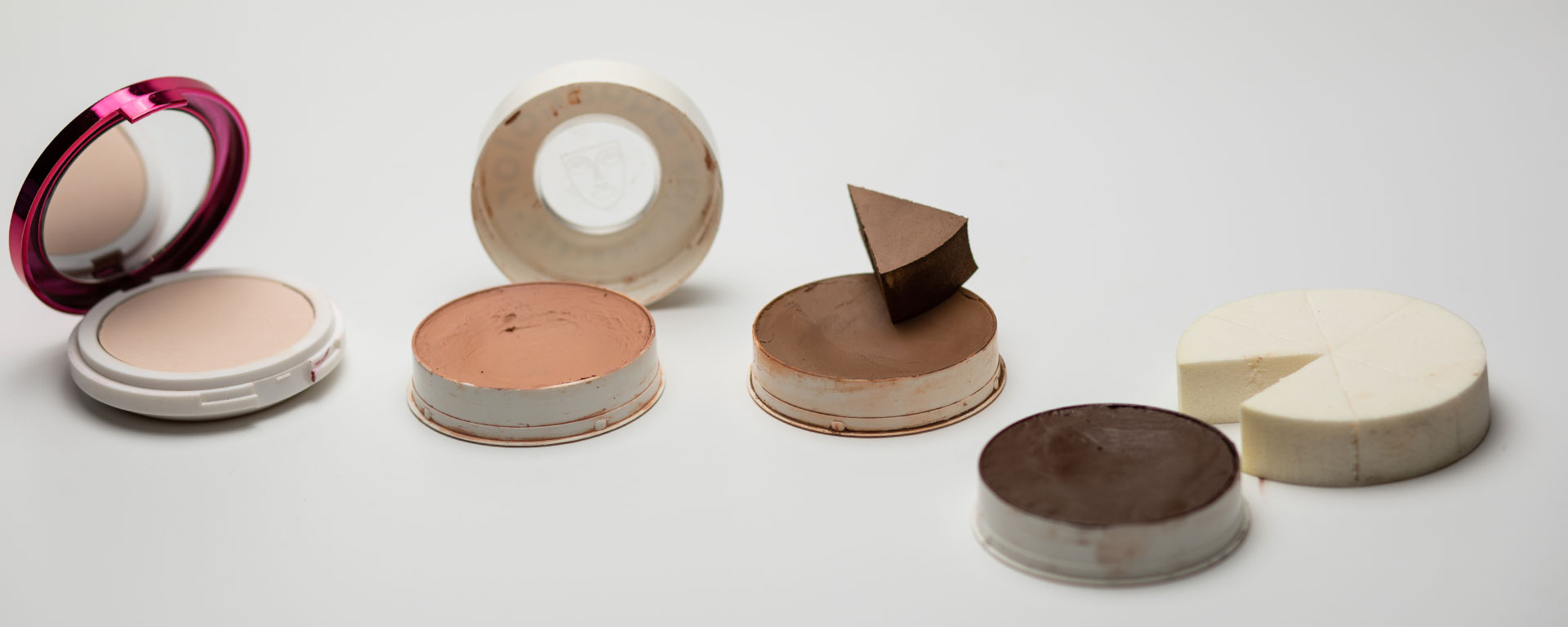
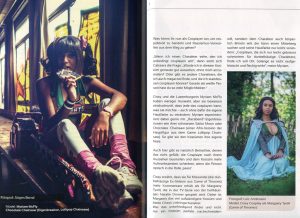
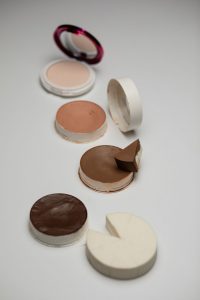


I wish we could reach a time when this stops beeing an issue. I was just thinking about perhaps cosplaying again and I would love to do Guinan fron Star Trek TNG. Of course I will not, I absolutely do not want to hurt peoples feelings. But with some of these characters it is sad how underrepresented they are. Thats why I say I dream of a time when I can do it a a tribute to a hero of mine. Of course she is not only defined by her skin color but its part of her. I will not live to see a time when racism is so far gone that it stops to be that way.
Thank you for sharing your thoughts, Daniela! Among the cosplayers I talked to, there is something like a consensus that you can cosplay what you want, as long as you don’t try to look like a different ethnicity (like darken your skin or wear an ethnic hairstyle) because that’s actually offensive to many PoC.
It’s not disrespectful to want to pay homage to your favorite character! However, I do understand that you’re wary about wearing a cosplay when you feel like you can’t do the character justice, or when you’re afraid that you might be criticized for it either way.
Guinan is a tough one, but if you feel like you can pull off the costume with your own skin tone and altered hair? I’d say go for it and spread the love!
Hey, fuck you. Ok?